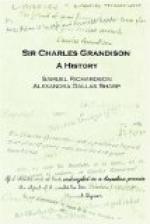Mr. Beauchamp is an agreeable, and, when Sir Charles Grandison is not in company, a handsome and genteel man. I think, my dear, that I do but the same justice that every body would do, in this exception. He is cheerful, lively, yet modest, and not too full of words. One sees both love and respect in every look he casts upon his friend; and that he is delighted when he hears him speak, be the subject what it will.
He once said to Lord W——, who praised his nephew to him, as he does to everybody near him; The universal voice, my lord, is in his favour wherever he goes. Every one joins almost in the same words, in different countries, allowing for the different languages, that for sweetness of manners, and manly dignity, he hardly ever had his equal.
Sir Charles was then engaged in talk with his Emily; she before him; he standing in an easy genteel attitude, leaning against the wainscot, listening, smiling, to her prattle, with looks of indulgent love, as a father might do to a child he was fond of; while she looked back every now and then towards me, so proud, poor dear! of being singled out by her guardian.
She tript to me afterwards, and, leaning over my shoulder, as I sat, whispered—I have been begging of my guardian to use his interest with you, madam, to take me down with you to Northamptonshire.
And what is the result?
She paused.
Has he denied your request?
No, madam.
Has he allowed you to go, my dear, if I comply, turning half round to her with pleasure.
She paused, and seemed at a loss. I repeated my question.
Why, no, he has not consented neither—But he said such charming things, so obliging, so kind, both of you, and of me, that I forgot my question, though it was so near my heart: but I will ask him again.
And thus, Lucy, can he decline complying, and yet send away a requester so much delighted with him, as to forget what her request was.
Miss Grandison—Lady G——, I would say—singled me out soon after—This Beauchamp is really a very pretty fellow, Harriet.
He is an agreeable man, answered I.
So I think. She said no more of him at that time.
Between dinner and tea, at Lady L——’s motion, they made me play on the harpsichord; and after one lesson, they besought Sir Charles to sing to my playing. He would not, he said, deny any request that was made him on that day.
He sung. He has a mellow manly voice, and great command of it.
This introduced a little concert. Mr. Beauchamp took the violin; Lord L—— the bass-viol; Lord G—— the German flute; and most of the company joined in the chorus. The song was from ‘Alexander’s Feast:’ the words;
Happy, happy,
happy pair!
None but the good
deserves the fair:
Sir Charles, though himself equally brave and good, preferring the latter word to the former.




